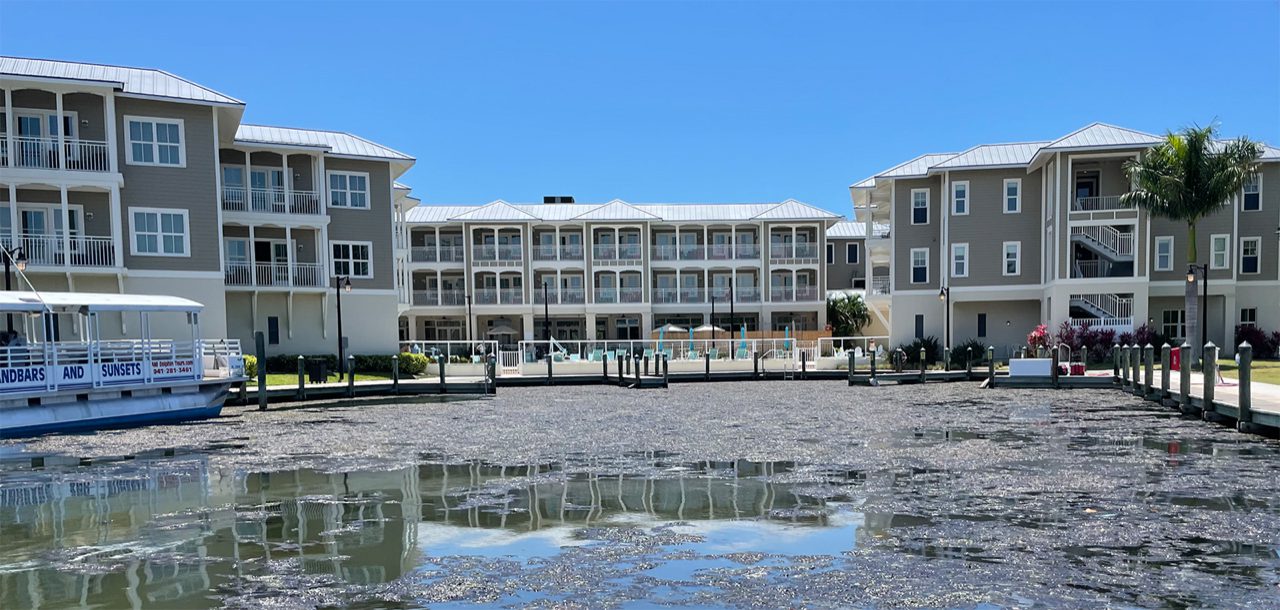Suncoast Waterkeeper and partner environmental groups Tampa Bay Waterkeeper, Manasota-88 and Our Children’s Earth Foundation have once again given local anglers cause for some badly needed optimism. This past week, a settlement of a Clean Water Act lawsuit against the city of Bradenton was announced.
Suncoast Waterkeeper initiated the lawsuit last year in response to repeated sewage spills into the Manatee River and local waterways. Local guides such as Captain Justin Moore suspected that those releases had exacerbated the historic lyngbya blooms we’ve experienced over the past three years.
“Bradenton’s wastewater system and water infrastructure were woefully outdated, as they are in too many communities throughout Florida,” said the Suncoast Waterkeeper board’s environmental attorney, member and founder Justin Bloom. “The historic lack of investment in infrastructure harms the health of our communities and waterways. This settlement guarantees that the City of Bradenton will make much-needed upgrades in their wastewater- and sewage-treatment system.”
The groups documented that, over the past five years, the city had spilled over 160 million gallons of partially treated sewage into the Manatee River, bypassing the city’s treatment plant. During that time, the city also had discharged millions more gallons of reclaimed and raw sewage from its aging sewage system, which is plagued by structural deficiencies.
“Citizen suits are critical for addressing pollution problems that would otherwise be ignored,” said Annie Beaman of Our Children’s Earth. “In Bradenton (and many other Florida cities), government officials have been kicking the can down the road for too long. Clean water is a priority and, in coming to the table to settle, the City of Bradenton has demonstrated that it is willing to prioritize water quality. If we invest in clean water now, we will avoid much higher costs to people and the environment in the future.”
The settlement sets firm deadlines for improvements to the city’s sewage-treatment plant, including increasing pumping and treatment capacity and upgrading disinfection capabilities. The city will also have to address issues in the collection system, including assessing the condition of pipes, finding leaks and ensuring the availability of backup power. Along with all these changes will be an update to the city’s capacity, management, operation and maintenance programs for its sewage-collection system.
“The public has a right to know what is flowing into our waterways and how municipalities are managing their wastewater systems,” said Glenn Compton of ManaSota-88. “Reporting has been lacking. This settlement lays out protocols for how the city needs to report spills and diversions and also requires the development of a website that will provide the public with up-to-date information on water quality and incidents.”
Bradenton also will be required to invest at least $220,000 in projects to improve local waters and/or estuarine habitats.
“The city’s approach to the lawsuit was collaborative and highly productive,” said Justin Tramble, executive director of Tampa Bay Waterkeeper. “The parties worked together to understand the issues and negotiate solutions, resulting in the detailed work requirements reflected in the settlement. The city is clearly committed to focusing on fixing its sewage infrastructure issues as soon as possible.”
The Bradenton settlement is a part of an ongoing effort by environmental advocacy groups to protect waterways through legal action. The successful Clean Water Act cases the Waterkeeper groups, led by Bloom, have initiated against St. Petersburg, Gulfport and Largo have been some of the few bright spots for Florida’s environment.
SCWK’s work with Sarasota County, where a settlement was negotiated without filing suit, looms large. Once again, the parties were able to focus their time, energy and resources on resolving the claims and fixing the failed sewage system rather than litigating. Like many municipalities in Florida, the county’s collection system needed upgrades and repairs.
The most significant failure, which was the focus of that case, was the reclaimed water system from the county’s largest sewage treatment plant. For nearly a decade, the effluent from the plant flowed over the banks of the storage pond into Phillippi Creek and into Sarasota Bay, bringing nearly a billion gallons of wastewater with high concentrations of nitrogen into an estuary that was seeing increased algae blooms and seagrass losses associated with excess nutrients. The spills were hidden from the public and other stakeholders that were working hard to improve water quality in Sarasota Bay.
This case was resolved with a commitment, under a federal court order with oversight and monitoring, to upgrade the collection system and stop the spills. Sarasota County recently broke ground on $215 million in upgrades as a result of this case and, to date, there have been no new spills from the storage pond.
The work of the Waterkeeper groups and their partners has made a difference in water quality and helped the local fishery resource as well. As good as these wins were for anglers and others who use and enjoy our coastal environment, much remains to be done. Join in this effective movement online.



